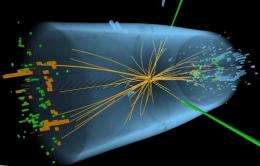CERN scientists brainstorm future role

Scientists who searched for the famous Higgs Boson concluded a three-day brainstorming session on Wednesday for mapping a long-term global strategy for particle physics.
The conference in Krakow, Poland, follows the July 4 announcement of the discovery of a new particle consistent with the elusive boson, which is believed to confer mass.
The breakthrough was made in the Large Hadron Collider (LHC), a huge underground lab at the European Organisation for Nuclear Research (CERN) near Geneva.
Completed only four years ago at a cost of 6.03 billion Swiss francs (five billion euros, $6.27 billion dollars), the LHC is scheduled "to run well beyond 2020" but planning needs to start now so that research continues seamlessly after it is decommissioned, CERN said.
"Although the LHC is at the beginning of its research programme, the long lead-times for the development of high-energy frontier research facilities, as well for some precision experiments, requires preliminary work to begin early in order to maintain continuity," it said in a press release.
The Swiss news agency ATS said the successor could be an accelerator housed in an 80-kilometre (50-mile) tunnel between Switzerland and France, or a new facility in Japan or the United States.
CERN insisted that for the moment these were only "ideas," put forward at the Poland meeting.
"It's absolutely normal that people put their ideas on the table. That's how it's always been at these meetings since the 1970s. These things take so long (to put in place)," CERN spokeswoman Renilde Vanden Broeck told AFP.
"Nothing, absolutely nothing has been decided," she added. "The only thing certain is that the LHC accelerator will be in service until at least 2020."
The Krakow meeting gathered 500 particle physicists.
A "strategy group" will distil their conclusions into a document that will be by discussed by CERN's governing council in May 2013.
CERN's member states are European, but the prestigious organisation has global reach. India, Japan, Russia and the United States participate as observers.
The finding of the new boson has been hailed as one of the biggest scientific achievements ever. Work is continuing to see whether the new particle is the Higgs, whose existence was theorised in 1964.
(c) 2012 AFP


















